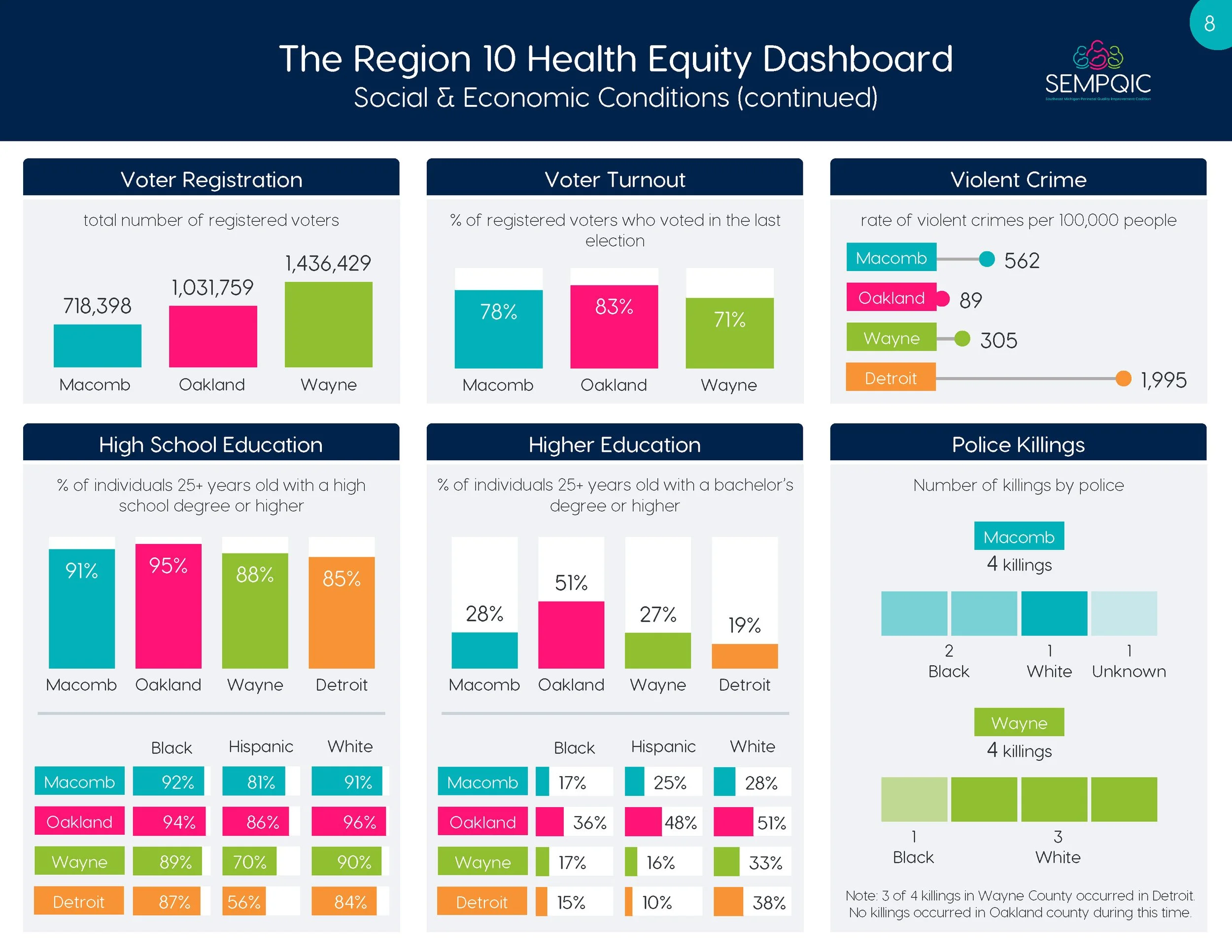
Data Dashboard
About the Dashboard
The dashboard is published with a vision of Detroit as a community with access to affordable, safe, quality housing, food, and hazard-free air and a clean environment as a foundational right of anyone that lives here.
The Detroit Health Equity Dashboard contains eight health related dimensions that correlate with perinatal health status found nationally, including broader health measures that contribute to infant mortality and maternal morbidity and mortality. Recognizing the well-established belief that infant mortality rates reflect the health of the community, this Detroit Health Equity Dashboard has been developed to include the socio-ecological factors that influence the overall existence of women and families. In 2020, Michigan’s governor, Gretchen Whitmer, issued an executive order declaring racism a public health crisis. Literature has verified the significant influence of the social determinants of health (SDOH) on the consistent presence of racial/ethnic health disparities, and we are now aware that systemic racism is the driving force behind all SDOH. The intent of this Detroit Health Equity Dashboard is to annually share the current, existing data elements, including systemic racism indicators, that impact perinatal health as a tool for users to identify points of influence to improve the health of the Detroit perinatal community through advocacy, policy setting, research or organizational goal setting.
In addition, it is our desire that the data and resources here-in, be utilized with the recognition that, despite some of the dire data, we are seeking a paradigm shift, from an emphasis on risk to an emphasis on resilience and strengths. Also, it is our desire to change the narrative, which tends to be negative, to one of power driven by Black communities and families, which cannot happen without an intentional focus on dismantling systemic racism.
The People of Detroit (Demographics)
Community & Neighborhood Conditions
Social & Economic Conditions
Life Experiences & Mental Health
Access to Quality Care
Physical Health
Maternal Child Health
This dashboard is published with a vision of Detroit as a community with access to affordable, safe, quality-housing, food, and hazard-free air and a clean environment as a foundational right of anyone that lives here. The data shown here offers opportunities for action that can transform Detroit into this vision and improve the health of women and infants in the city.
The metrics were informed by the collective impact advisory committee and were selected based on the potential to track over time, and the ability to examine equity through a racial and geographic lens. Indicators were publicly available from national (e.g., US Census Bureau), state (e.g., BRFSS), and local data resources (City of Detroit Open Data Portal). Additionally, the Michigan Department of Health and Human Services Maternal Child Health Epidemiology Section, Michigan PRAMS team, and Michigan BRFSS teams provided Detroit-specific maternal, infant, and health outcome metrics.
Throughout this dashboard, different geographic areas are used as points of comparison to Detroit data. “Outer Wayne” refers to Wayne County rates minus Detroit data, and “Rest of Michigan” refers to Michigan rates minus Detroit data.
All numbers presented in this dashboard represent Detroit data unless otherwise noted.
A complete description of the source of data included in this report is found at the end of the Dashboard. The selected data sources were used because they are believed to have a respected level of integrity. This dashboard will be updated annually as new data become available.

